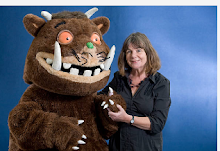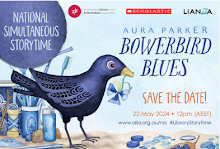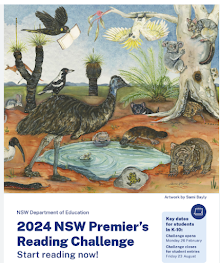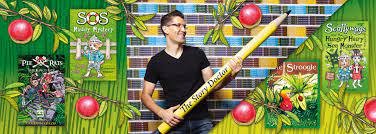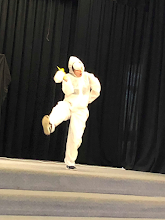For
seventy-two years the Children’s Book Council of Australia has been running the
book week celebrations. In the library we honoured book week by studying the
shortlisted and notable books that have been produced in the preceding year.
This study culminates with our annual book parade. As usual, the students and
staff went to a great deal of trouble to showcase their favourite book
characters and demonstrate their love of literature.
The
highlight of the parade was the arrival of Skippin the library dog, our mascot.
Skippin is named after the first principal of Cromer Public School, Lyle
Skippin. The students read and enjoy
literature in the Lyle Skippin library in honour of the man who imparted his
love of reading to the first students in our school. His legacy burns bright in
our library.
Cromer
students again participated in the MS Readathon. This is the fourth year that
we have participated in this event. Eighty-one students have signed up and
together, have raised $2100.
Fifty-eight
students completed the Premier’s Reading Challenge and will receive their
certificates in November.
The students
in Kindergarten to Year 2 greatly enjoyed the visit of author Rebecca Johnson
to our school. Rebecca noted that the students were extremely engaged, respectful
and a joy to have as an audience. The students have been very keen to borrow
copies of her books as a result of this inspirational visit.
The students
in the primary school were greatly entertained by author/illustrator Martin
Chatterton who regaled them with the stories of his journey as a writer and
illustrator and entertained them by drawing caricatures of a number of students
and teachers. It is always exciting for students to meet authors in the flesh.
The Program
of Study for Term Four
Kindergarten
The students
in kindergarten will undertake a study of the non-fiction genre. Non-fiction
texts help students to learn about the real world. The challenge is to match
high interest topics with the reading ability of the student. Studies show that
students who are reluctant to read fiction texts can become motivated to read
when introduced to appropriate non-fiction.
I have found
that past kindergarten students have really enjoyed the items in our
non-fiction collection dealing with the topic of weather. They are especially
interested in the subject of extreme weather such as tornadoes and hurricanes.
Our studies of the weather this term will
incorporate fiction, non-fiction and digital stories, activities and texts.
Stage One (
Years One and Two) and K/6J
Aaron Blabey
is one of Australia's most loved authors for children. He has nearly four
million books in print, many of which are multiple award winners. He was the
2012 National Literacy Ambassador and, in 2015, The Brothers Quibble was featured in National Simultaneous
Storytime.
Blabey's
books are extremely popular in our school library and in 29 other countries. He
often uses the poetic genre and his stories are humorous, often with a moral.
The text is always supported by his engaging illustrations.
The students
in stage one will study eleven books in this unit.
Stage Two
(Years Three and Four)
A unit of
work has been designed to support the Stage 2 geography unit. In this study the
students will focus on Uluru. The resources which will be accessed in Stile are
aimed to help students acquire the skills and develop the knowledge needed to
become geographically aware and active students. Themes of sustainability,
Aboriginal peoples (Anangu), the natural environment and the values of
different people can be seen through the links provided. Uluru is an iconic,
world heritage site about which everyone has an opinion. Ultimately the value
in which people hold Uluru, in turn impacts the rock itself, its surrounding
environments and the traditional custodians of the land.
Stage Three
( Years Five and Six)
The students
in stage three will undertake a research project investigating two significant
sites in Australia, Lorna Glen Western Australia and Fraser Island. Lessons
have been devised in Stile which will enable investigations of the geographical
features, native fauna and the traditional owners of each region.
The aim of
this unit of study is to hone the research skills of the students while helping
them to gain greater awareness of the Aboriginal perspective and a deeper
respect for Australian significant sites and the animals and people that
inhabit them.
Annual
Stocktake
The library
will be closed for borrowing from week eight of this term while we undertake
the annual stocktake. We ask that all books be returned to library by the end
of week seven.




